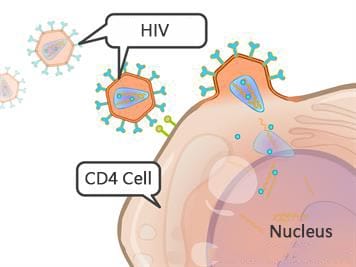
What is CD4?
CD4 cells refer to T lymphocytes with CD4+ T molecules on their surface. They are important immune cells in the human immune system. Since HIV targets CD4+ T cells, the test results can be used to determine the effectiveness of AIDS treatment. It plays an important role in the judgment of the patient's immune function.
What is CD4 Count?
A CD4 count is a test that detects how many CD4 cells are in the blood. These are white blood cells called T cells, whose function is to find and destroy bacteria, viruses and other invading pathogens in the body.
The role of CD4 detection
CD4 count test results can help doctors understand how compromised your immune system is and what might happen if you don't start antiretroviral therapy (ART). All HIV-infected people should receive antiretroviral therapy, regardless of whether their CD4 count is high or low. Instead, CD4 counts should increase with effective antiretroviral therapy. Research shows that maintaining CD4 counts with effective antiretroviral therapy can stop HIV symptoms and complications and help you live longer. In fact, studies have found that people with HIV who adhere to their usual treatment can achieve lifespans similar to those of people who are not HIV-infected. In addition to antiretroviral drugs, people with very low CD4 counts may need medication to prevent certain opportunistic infections (OIs). These OI medications can be discontinued once ART causes an increase in CD4 counts.
What does HIV do to CD4 cells?
HIV damages your immune system because it targets CD4 cells. The HIV virus grabs onto the CD4 cell surface and enters and becomes part of the cell surface. When the infected CD4 dies, more HIV copies are released in its flow. These new HIV viruses continue to find and enter more CD4 cells and keep circulating, resulting in fewer and fewer normal CD4 cells. HIV can destroy the entire system of CD4 cells, and bacteria can easily enter your body. The resulting diseases are called opportunistic infections(OIs).
What happens to opportunistic infections?
A normal CD4 count is 500 to 1,400 cells per cubic millimeter of blood. In HIV patients not receiving antiretroviral therapy, CD4 counts decline over time. At levels below 200 cells/cubic millimeter, patients are susceptible to a variety of OIs, many of which can be fatal. Anyone who is HIV-positive should take antiretroviral therapy (ART) medication, regardless of their CD4 count and symptoms. Your CD4 count should remain stable or rise while your treatment is in effect. If your CD4 count does not rise for months on antiretroviral therapy, your virus may become resistant to the drugs you are taking. This can be seen in HIV viral load tests, which doctors should do every few months. In this case, your doctor may want to change your antiretroviral medication.
Other Factors Affecting CD4 Cell Counts
Factors other than HIV can also affect how high or low your CD4 count is. E.g:
- influenza pneumonia
- Herpes simplex virus (including cold sores)
- cancer chemotherapy treatment
These infections can cause your CD4 cell count to drop temporarily. When you have cancer treated with chemotherapy, your CD4 count also goes down.
Most accurate and useful CD4 count results
When you are diagnosed with AIDS, you should have a CD4 count test as a "baseline measurement." This allows your doctor to compare future test results. In addition to the drugs available to treat HIV, it can also help assess the need for drugs to prevent specific OIs. Taking an HIV viral load test 2 to 8 weeks after you start or change treatment can help your doctor determine how well ART is working. A CD4 test will indicate whether the immune system has improved due to antiretroviral therapy. Then, you should usually get a CD4 test every 3-6 months or as recommended by your doctor to see how your immune system is doing. People with low CD4 counts are taking medications in addition to antiretroviral drugs to prevent specific OIs that can be blocked because their immune systems respond to antiretroviral therapy. People with CD4 counts above 500 who maintain viral suppression may not require further CD4 testing.
(Text Only)

